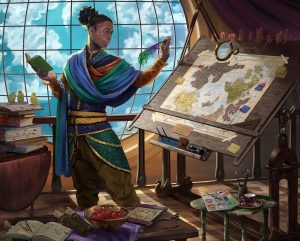
Game Changer is our monthly advice column for new GMs and older GMs who aren’t afraid to learn something. Our resident GMing expert, Brian Suskind, draws from his cauldron of experience to let you know how it goes.
You might recognize Brian’s name from any of a slew of past Kobold Press products such as Campaign Builder: Castles & Crowns (a homebrew kit to build out the kingdoms in your own world) and the Tales of the Valiant Monster Vault.
This month’s question is a perennial ask:
Anonymous New GM asks . . .
I’ve been running a game for almost a year and it’s going all right, but I realize I don’t know how to end it. How do I end a campaign?
Finishing a campaign in a satisfactory way can be challenging for many GMs, especially considering the various ways a campaign can end. Let’s look at how a campaign can end and examine what makes a good ending.
How Do Campaigns End?
Completing a campaign, regardless of its length, is hard. If you manage it, give yourself some applause because it’s a feat many have tried to do and failed.
But campaigns don’t always end because the heroes complete their tasks. Some end because everyone dies. Some end because the players grow weary of the story. Some end because of mundane issues such as the GM or players moving away, work changes, relationships, natural disasters, or any of the “real life” things we have to deal with. The three most common reasons a campaign ends are fatigue, sudden ends, and victory/death.
Ending Type 1: Fatigue
When you run a full campaign it can be hard to keep players’ interest levels and engagement high. There’s a whole separate article’s worth of info on this topic. I should write that some time.
When the players lose interest and you can’t get it back, the campaign probably stutters to an end. The challenge here is to wrap things up within two to three sessions.
The best advice is to have the bad guys suddenly kick things into high gear. They move their plans ahead. The characters discover the foe’s hidden fortress. However you shoehorn it in, make things happen now-ish.
Reserve at least one game session for the entire final fight and Campaign Aftermath (more on that later). Use the other two sessions to get the PCs where they need to go. If you can wrap up any other plotlines along the way, go for it. The estranged parents suddenly see the error of their ways, for example. It’s the “divine hand” coming in to make it go the PCs way.
Ending Type 2: Sudden End
This ending unfortunately happens frequently. It happens when the GM or a majority of the players suddenly can’t play anymore. I played in a campaign once, and the GM had a real-life crisis that meant she had to move a few cities over. It meant the campaign not only ended, but it was over immediately. We all understood the reasons and just had to wash our hands of the game, but it is unsatisfying. If you can manage it, try to get in one last game session to wrap things up.
The best advice for a one session ending is to have the bad guys show up wherever the PCs are and launch into a final fight immediately. They forgo their long, complicated plans to confront the meddling characters now.
Half of that final session should be the fight, and reserve the last half for the Campaign Aftermath. You’ll have to live with some plotlines unresolved, and everything might feel contrived and rushed, but you’ll have an ending.
Ending Type 3: Victory/Death
This is what most people hope for. After many struggles and trials, the characters drive the story, wrapping up plotlines and arcs until they confront the bad guys in a final fight. At that point, it doesn’t matter if they win or they lose. Either way will be epic and you can move right into the Campaign Aftermath.
I have no advice if you reach this ending. If you’re here, you did all of the things I would have suggested. As much as anyone can, you won an RPG. Nice job!
What Makes an Ending Good?
No matter the reason behind your campaign ending, consider what makes a good ending.
The answer can change depending on the GM and players at the table. After all, some players find TPKs satisfying. I consider them to be wrong, but that’s OK. It’s the Internet. Let’s practice letting people be wrong here.
So what makes an ending satisfactory or good? A good ending has three parts: A Tipping Point, Give ‘Em What They Want, and Campaign Aftermath. Keep in mind, these aren’t sequential features. They often blend together.
The Tipping Point
Ideally, the campaign has been player-driven, and the players pushed the story forward and the GM hasn’t forced them to play through a scripted “epic” plotline that unfolds like a fantasy novel fever dream.
But just because a game is driven by the players’ decisions, that doesn’t guarantee a good ending. As a GM we have to force it to be good. Usually this means taking some of the player agency away right at the end.
Hold out as long as you can. But you’ll hit a tipping point where the outcome of the campaign seems assured. Often this tipping point comes toward the end of the final fight when it becomes clear the heroes are going to win. At that point, railroad the crap out of the story. Fudge dice rolls. Make NPCs act the way you need them to, rather than how they “should.” Play up the heroes in an almost embarrassing way. Anything to make sure the ending is dramatic and satisfactory.
Give ‘Em What They Want
You can make an argument about tying up loose ends, completing quests, or dealing with the BBEG, but all of that boils down to one thought. GIVE THE PLAYERS WHAT THEY WANT. This works hand in hand with tipping points to makes a good ending.
The players have invested their time and effort into the game. When it comes to an end, they want to achieve their goals. This may be different for each of them, and it wouldn’t hurt to check in with your players to learn what they want.
There’s an old axiom in screenwriting that a story follows a character as they struggle to get what they need (as opposed to what they want). You know when the story ends because the character got what they need.
RPGs can be a little different, because you can give them what they want in addition to what they need. You’ll know you’ve reached the end when the characters get that, and crucially, the players also get what they want. One of these is inside the game world, and the other is in reality. But giving them what they want gives any ending the feeling of completion and satisfaction which, in turn, makes it memorable.
But you might be thinking, “In a player-driven RPG how do you ensure the players get what they want?”
There comes a point when you just cheat. (See GMing Like an Author for more on “good” cheating.) Take the final fight, for example, when the battle hits the tipping point where the outcome is assured, you could let it play out with the heroes doing little bits of damage until the foe finally collapses. But that isn’t satisfactory. The players want a big moment. The death monologue. The hero rises up from certain defeat to land one last strike.
Keep the bad guy alive another round so they can deliver that last blow to almost kill one of the characters, or to make a run for the doomsday button. Throw in some divine intervention from a character’s otherworldly patron to bring them out of unconsciousness at the right time. The possibilities are endless but they should ALL be aimed at making the ending epic and dramatic.
Campaign Aftermath
After the characters win or lose, then what? I enjoy asking the players to work together to describe how the world and their characters are one year to five years after the events of the story. In a lot of ways, this is a bit like another Session Zero where you are all participating in group storytelling. This is also a good place to finish any loose ends or plotlines you might have missed before the final confrontation.
When you wrap them up here, it’s in a narrative style. There’s no need to roll dice or anything. In general the players are in charge with the GM giving some directional prompts from time to time. The point of your campaign aftermath is to say goodbye to the characters and the world of the campaign.
Do you have a question for Game Changer? Tell us about it. Then check back first Friday of each month for more Game Changer!
Read more at this site
